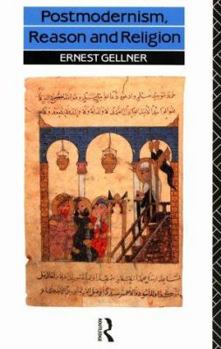Postmodernism, Reason and Religion
Select Format
Select Condition 
Book Overview
First Published in 1992. Routledge is an imprint of Taylor & Francis, an informa company.
Format:Paperback
Language:English
ISBN:041508024X
ISBN13:9780415080248
Release Date:August 1992
Publisher:Routledge
Length:256 Pages
Weight:0.38 lbs.
Dimensions:0.5" x 5.1" x 7.7"
Customer Reviews
2 ratings
3 card Monte
Published by Thriftbooks.com User , 15 years ago
By far the best part of this book is its droll, ironic, facetious demolition of the cultural relativists turned deconstructionists. As Gellner observes, relativism is good for allowing people their choice of wallpaper, little more. I was disappointed that there was not more in this brief book on fundamentalist Islam, since it was advertised as having been written as half of a duplex along with an Islamic historian. My main critique of Postmodernism ... is that Gellner presents the reader with a kind of intellectual 3 card monte. Postmodernism on the left is 'bad,' fundamentalist religion on the right is 'bad,' ergo, the only card left standing, in the middle, his brand of Englightenment Fundamentalist Secularism (as he candidly calls it) must by the process of elimination be 'good.' But those 3 categories are numerically incomparable. There might be 50 thousand committed postmodernists in the world--insignificant. There might be 400 million EFS's in the world, western europe plus bicoastal university USA. There are probably 2-3 billion committed religious believers in the world. But folks in Gellner's and the postmodern microcosms snobbishly condescend to those poor beknighted refugees from the 13th century. Gellner's big mistake here is to equate all sincere religious belief with fundamentalism, a bad gaffe for a sociologist, who should at least be able to correctly report what a given community thinks, believes, etc., even if he doesn't agree. But most Christians I know, and I believe most Muslims, and Hindus, are post rationalist, not pre-rationalist. That is, we take the best of the enlightenment, dredge its many infirmities, and add the good to the already very good religious faith. Two superb examples of this would be Popes John Paul II and Benedict XVI, both of whom were highly degreed and intellectually acclaimed in the maw of the enlightenment, saw its positives, rejected its weaknesses, and blended the one with the other, to create a superior development (not change) to 21st century Catholicism. Gellner is to be praised for admitting that the 2 attempts at putting 100% pure enlightenment-ism into political action were train wrecks, the french and russian revolutions. He also admits that his enlightenment fundamentalist rationalist secularist religion probably could have only grown up on Judaeo-Christian soil. But the problem is, is that the EFRS religion has been living off the fumes of Christendom for centuries, cutting the limb on which it is sitting, and soon the cultural vacuum which is europe (and bicoastal USA) will be ripe for plucking by immigrants with a more muscular response than 'whatever.'
The triumph of the Enlightenment?
Published by Thriftbooks.com User , 20 years ago
In this brief but scintillating essay, Ernest Gellner describes the current intellectual situation faced by humankind, lays out his own allegiances, and offers his hopes for the future. Gellner argues that there are three basic options of belief available today: he describes these as "Religious fundamentalism," "Relativism, as exemplified by the recent fashion of 'postmodernism'," and "Enlightenment rationalism or rationalist fundamentalism." As an example of fundamentalism, Gellner focuses not on the long-maligned Christian fundamentalism of the West but rather on the Islamic fundamentalism which has recently captured the world's attention (Gellner's essay was published in 1992, nearly a decade before the 9/11 catastrophe). Gellner credibly argues, contrary to the views propagated by Muslim-haters in the West, that in many ways Islamic fundamentalism is a modernizing and rationalizing force. For example, he explains, "Contrary to what outsiders generally suppose, the typical Muslim woman in a Muslim city doesn't wear the veil because her grandmother did so, but because her grandmother did _not_: her grandmother was far too busy in the fields, and she frequented the shrine without a veil, and left the veil to her betters. The granddaughter is celebrating the fact that she has joined her grandmother's betters..."Gellner further argues that "a certain kind of separation of powers was built into Muslim society from the very start...It subordinates the executive [i.e., the government] to the (divine) legislature and, in actual practice, turns the theologians/lawyers into the monitors of political rectitude..."This may seem an odd point to make given the contempt and derision which Western media have heaped on, for example, the "mullahs" of Iran. And yet, for all its shortcomings, the Islamic Republic of Iran has shown more capacity for self-criticism, more actual democracy, than most secular regimes in the Islamic world (e.g., Saddam Hussein's Ba'athist regime in Iraq). And the atrocities committed by the mullahs are almost insignificant compared to the tens of millions of innocent persons murdered by the anti-religious socialist regimes which dominated Asia during the twentieth century (in the Soviet Union, Maoist China, Communist Cambodia, etc.). While Gellner is not an uncritical admirer of fundamentalism, Islamic or otherwise, he turns his main guns on his fellow academics, especially those who espouse "postmodernism" and other allied forms of relativism. Gellner explains that the universities are dominated by the research model provided by the natural sciences in which scholars are expected to constantly churn out genuinely new knowledge. But, he adds, "in fields such as the humanities, not only is it not clear that there is any cumulative development, any real 'progress', it is not always altogether clear what 'research' should or could aim it." So, in lieu of true scholarship, the humanities are seduced into "a setting up of artifici






